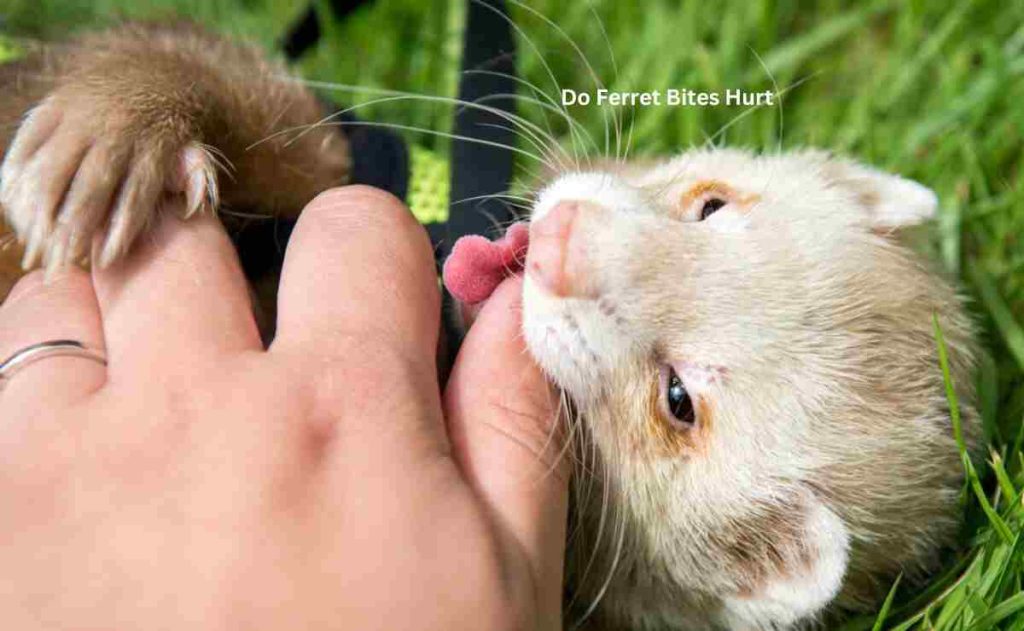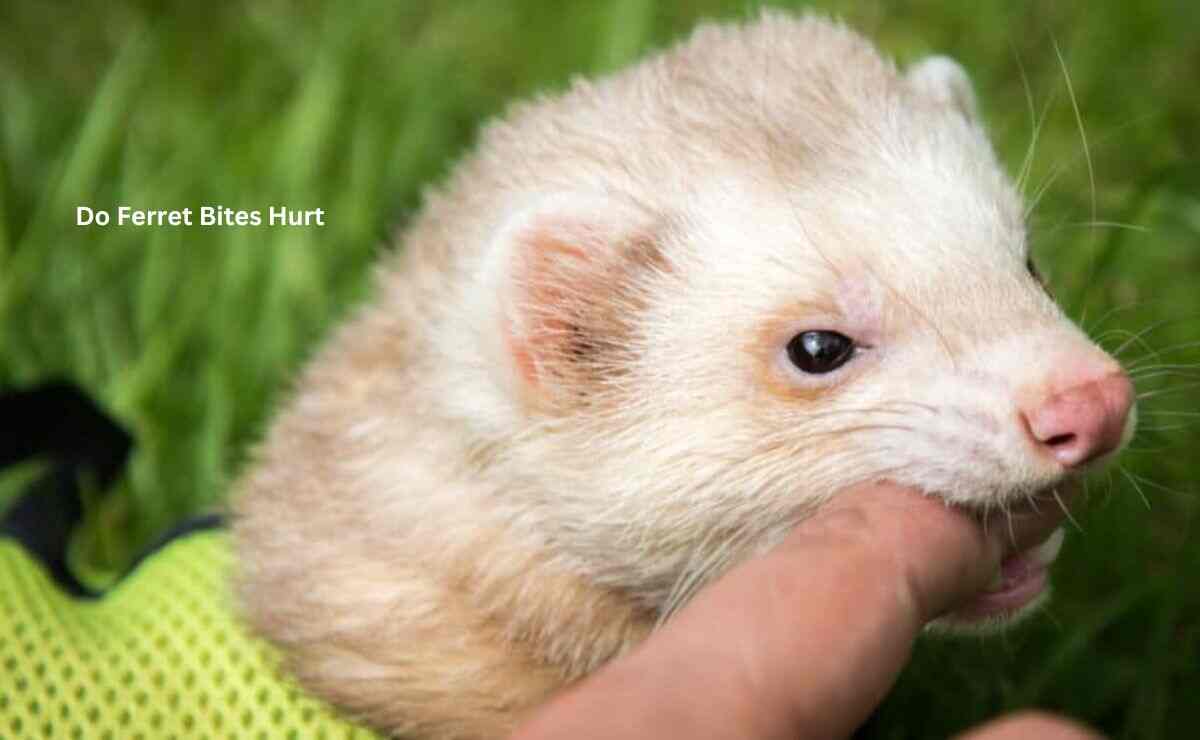Ferrets are adorable and playful creatures that can make wonderful pets. However, as with any pet, they come with their own set of risks and potential dangers. One such risk is the possibility of being bitten by a ferret.
If you are considering getting a ferret or already have one, it is important to know do ferret bites hurt and understand how their bites can affect you. While some may think that the small size of these animals means that their bites won’t hurt much, this is not necessarily true. In this article, we will explore whether or not ferret bites actually hurt and what you should do if you are bitten by one.
Do Ferret Bites Hurt?

Yes, ferret bites can hurt. Ferrets have sharp teeth and powerful jaws, so their bites can be quite painful. The severity of the bite depends on the size and strength of the ferret, as well as how hard it bites down. If you are bitten by a ferret, it is important to clean the wound with soap and water and apply an antibiotic ointment to help prevent infection.
It is important to note that ferrets may bite if they feel threatened or scared. It’s best to avoid situations where your ferret may feel this way by making sure you provide them with plenty of toys and activities to keep them occupied, as well as giving them regular handling and socialization time.
Additionally, make sure you are gentle with your pet when interacting with them. This will help reduce the likelihood that they will become aggressive and bite out of fear or anxiety.
Why Does A Ferret Bite?
Ferrets are naturally inquisitive animals and will often use their mouths to explore objects in their environment. Biting is a normal behavior for ferrets, as they do not have hands to manipulate objects like humans do. Ferrets may also bite out of fear or aggression if they feel threatened or uncomfortable in a particular situation.
In addition, ferrets can bite if they are bored or under-stimulated. Providing your pet with plenty of toys and activities can help reduce boredom-related biting. Additionally, it’s important to provide your ferret with regular handling and socialization from an early age so that it learns to trust humans and become comfortable in different situations.
Finally, it’s important to remember that biting is a natural behavior for ferrets, so it’s important to be patient when teaching them appropriate behaviors and discouraging unwanted ones.
What to Do When A Ferret Bites?
When a ferret bites, it is important to remain calm and take the necessary steps to prevent further bites.
First, it is important to identify why the ferret has bitten. Ferrets may bite out of fear or aggression, so it is important to remove whatever is causing distress or discomfort. If the ferret is feeling threatened, try to move away from the area and create a safe space for them.
Second, it is important to provide immediate treatment for any bite wounds. Cleanse the wound with warm water and soap, then apply an antibiotic ointment or cream. If the bite appears serious or infected, seek medical attention immediately.
Finally, make sure that your ferret has plenty of enrichment activities such as toys and playtime in order to reduce stress levels and prevent future biting incidents. Proper socialization can also help reduce fear-based biting behaviors.
How to Stop A Ferret from Biting?
The best way to stop a ferret from biting is to provide plenty of positive reinforcement. Ferrets are naturally curious and can sometimes bite out of curiosity or playfulness, so providing them with toys and activities that stimulate their minds and bodies can help reduce the chances of biting.
Additionally, it’s important to socialize your ferret from an early age by introducing them to new people and environments. This will help them become more comfortable around humans, reducing the likelihood of biting.
It’s also important to teach your ferret boundaries in regard to biting. When they do bite, give them a firm “no” and redirect their attention away from whatever they were playing with or doing that caused them to bite. After a few weeks of consistent discipline, your ferret should understand the boundaries you’ve set.
Why Does A Ferret Get Aggressive?
Ferrets are usually affectionate pet. Aggression in ferrets may caused by fear or territorial behavior. Fear-based aggression often occurs when a ferret is startled or feels threatened. Territorial aggression may be seen when a ferret perceives another pet as an intruder in its space.
Ferrets can also become aggressive when they are not properly socialized or handled regularly. When a ferret does not have enough positive interactions with humans, it can become scared and act out aggressively. Additionally, if the ferret does not receive regular handling and stimulation, it may become bored and lash out at people or other animals.
Hormonal changes can cause aggressive behavior in ferrets. Female ferrets that are not spayed may display aggression during their heat cycle due to hormonal surges. Male ferrets may also display aggression due to testosterone levels that increase as they age.
How to Calm A Ferret Easily?
Ferrets are naturally curious and energetic animals, so it can be difficult to calm them down. Here are some tips for easily calming a ferret:
- First, make sure your ferret is getting enough physical activity. A tired ferret is more likely to relax and nap than one that has too much energy. Provide plenty of toys and activities for your ferret to engage in throughout the day.
- Second, create a safe environment for your ferret. Make sure ferret cage is secure, with no potential escape routes or sharp objects they could harm themselves on. If you’re playing with your ferret outside of the cage, keep an eye on them at all times to ensure their safety.
- Lastly, provide your ferret with comfortable bedding and a quiet area of the house where they can go when they need some alone time. This will help them feel secure and relaxed when they need a break from playing and exploring.
Conclusion
Ferret bites can be painful and potentially dangerous if left untreated. It’s important to handle your ferret with care and respect to prevent bites from occurring in the first place. If you do get bitten, clean the wound immediately and seek medical attention if necessary.
Remember that while ferrets can become loving and playful pets, they are still animals with their own instincts and behaviors. By understanding their nature and taking proper precautions, you can enjoy a happy and healthy relationship with your furry friend. Stay safe and enjoy your time with your ferret!
